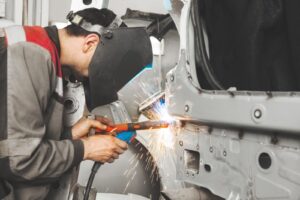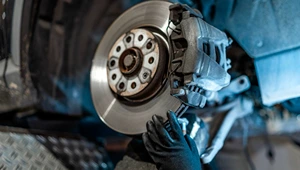Have you ever had your check engine light come on and wondered if it’s something serious? It might just be related to your car emission systems.
Emissions repairs are about keeping your vehicle running clean and efficiently while meeting environmental standards.
These fixes help reduce the amount of harmful gases your car releases into the air—like carbon monoxide and nitrogen oxides.
It’s not just good for the planet—it also helps you pass inspections, avoid fines, and keep your engine in top shape.
If you’re noticing strange smells, lower gas mileage, or your car failing an emissions test, it’s time to look closer.
What Are Car Emissions and Why Do They Matter?
The emission system in cars are the gases released by your vehicle’s exhaust system during fuel combustion. These emissions can pollute the air, contribute to climate change, and even affect your health. That’s why regulating and repairing your car’s emissions system is so important—for your safety and the planet’s.
- Carbon Monoxide (CO): A poisonous gas that can be deadly in high concentrations.
- Nitrogen Oxides (NOx): Contribute to smog and respiratory problems.
- Hydrocarbons (HC): Unburned fuel particles that contribute to ground-level ozone.
What Causes a Vehicle to Fail an Emissions Test?
Several common issues can cause your vehicle to fail an emissions test, even if it seems to run just fine.
Here are a few things that could be triggering the problem:
- Malfunctioning oxygen sensor: Leads to incorrect fuel mixture and increased emissions.
- Worn-out spark plugs: Incomplete combustion creates more pollutants.
- Loose or leaking gas cap: Allows fuel vapors to escape into the atmosphere.
- Damaged catalytic converter: Can’t properly filter harmful gases from exhaust.
Find an expert near you for an emissions test repair so the problem won’t be prolonged.
What Is Involved in Car Emissions Repair?
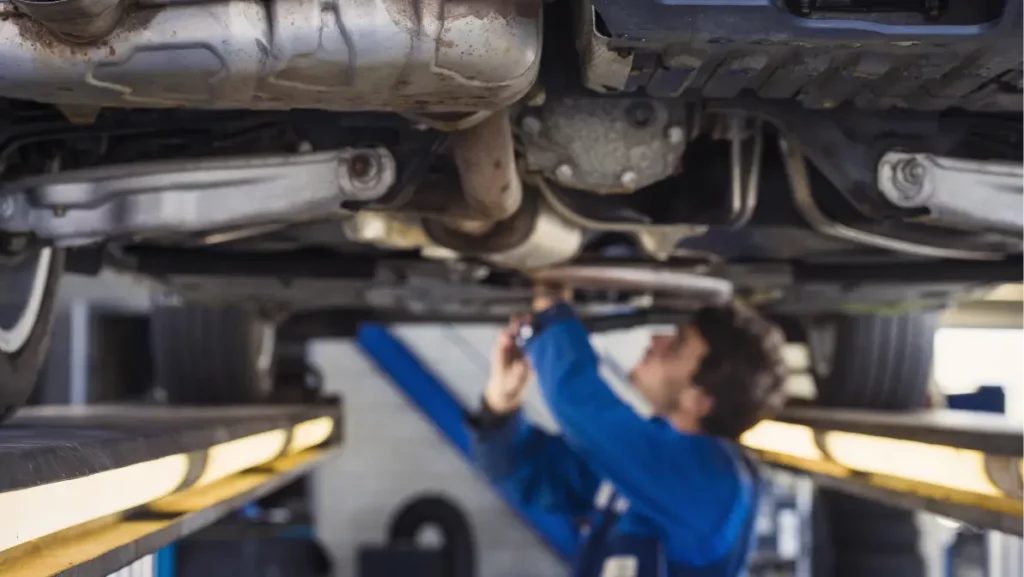
Car emissions repair typically begins with a diagnostic test to identify the root cause of the issue, such as sensor failures, exhaust leaks, or faulty components like the catalytic converter.
A certified mechanic will then repair or replace the problematic car emission parts, reset the vehicle’s onboard computer, and ensure everything meets state emissions standards. The goal is to reduce harmful gases while improving fuel efficiency and engine performance—helping your car run smoother, cleaner, and legally on the road.
How Do You Know If Your Car Needs Emissions Repair?
If you’re unsure whether your car needs emissions repair, there are several signs to watch out for. These warning signs may indicate that your vehicle is not operating as cleanly as it should be and could fail an emissions test. Catching issues early can help you avoid costly repairs down the line.
- Check Engine Light: The check engine emissions light could be triggered by a problem with the emissions system, such as a faulty oxygen sensor or catalytic converter.
- Decreased Fuel Efficiency: A malfunctioning emissions system can cause your car to use more fuel than normal, reducing gas mileage.
- Rough Idling or Engine Stalling: Issues with the exhaust or emissions system can cause your car to run erratically or even stall.
- Unusual Exhaust Smells: If you notice a strong, unusual odor from the exhaust, like sulfur or rotten eggs, it could indicate a problem with the catalytic converter.
- Failed Emissions Test: Of course, if your car fails an emissions test, it’s a clear sign you need emissions repairs to bring it back into compliance.
How Much Does Emissions Repair Typically Cost?
The cost of emissions repair varies depending on the issue, the vehicle make and model, and where the repairs are needed. Minor repairs, like replacing an oxygen sensor or fixing a gas cap, can cost as little as $100 to $300, while more serious repairs, such as replacing the catalytic converter, can range from $1,000 to $2,500 or more.
For an accurate quote and to get your vehicle properly assessed, contact us at Status Automotive & Collision in Houston, TX—we’ll provide a detailed estimate tailored to your car’s needs.
Can You Drive a Car That Failed an Emissions Test?
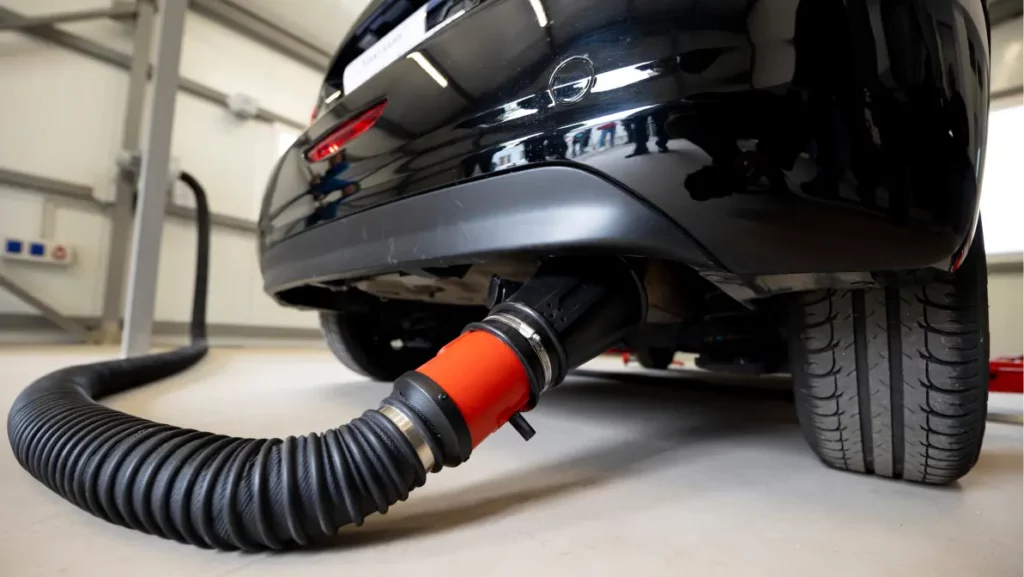
While it’s technically possible to drive a car that has failed an emissions test, it’s not advisable to do so for long. In some states, driving a vehicle that fails an emissions test is illegal, and you may be issued a fine or ticket.
Additionally, the car could be producing harmful emissions that contribute to air pollution. If your car fails the test, it’s best to address the issue promptly to ensure it’s repaired and compliant with state regulations.
How Can Routine Maintenance Help Prevent Emissions Problems?
Routine maintenance plays a crucial role in preventing emissions problems by ensuring that your vehicle’s components are functioning properly. Regular oil changes, air filter replacements, and keeping the exhaust system in good condition help maintain optimal performance and reduce harmful emissions.
Staying on top of these tasks not only improves fuel efficiency but also minimizes the risk of your car failing an emissions test, saving you from emissions repair cost repairs down the road.
What Role Does the Onboard Diagnostics (OBD-II) System Play in Emissions?
The OBD-II system in your vehicle is a vital tool for monitoring emissions-related components. It detects problems in the emissions system and triggers the check engine light when something is amiss.
This system can pinpoint issues with the following:
- Oxygen Sensors: Monitors the air-fuel mixture and helps reduce emissions.
- Catalytic Converter: Ensures the converter is functioning properly to filter pollutants.
- Exhaust Gas Recirculation (EGR) System: Reduces nitrogen oxide emissions by recirculating exhaust gases into the engine.
Why Is Timely Emissions Repair Important for Your Vehicle and the Environment?
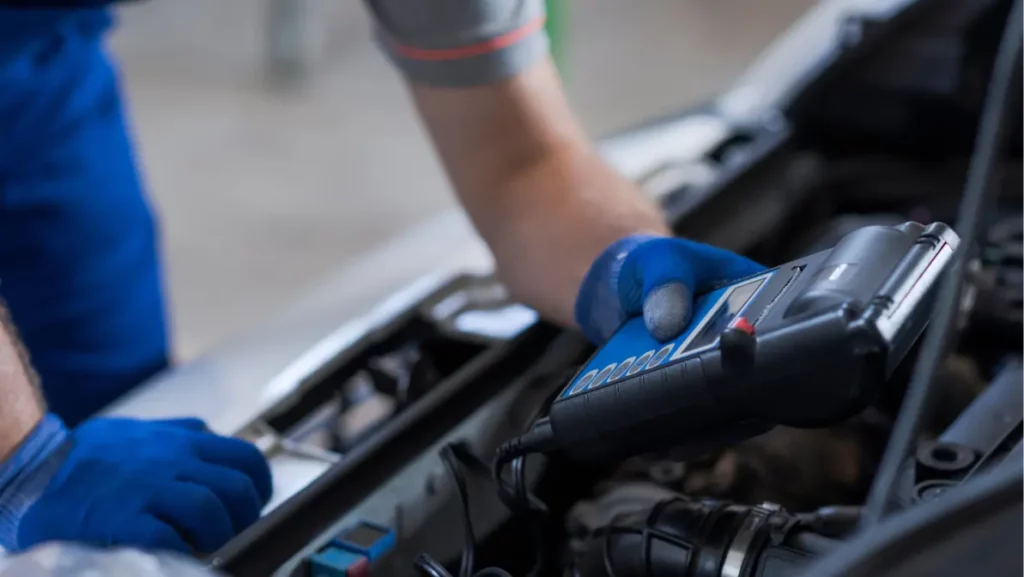
Timely emissions repair is essential not only for the health of your vehicle but also for the well-being of the environment. If left unchecked, emissions problems can lead to reduced fuel efficiency, engine damage, and failed emissions tests.
More importantly, a well-maintained emissions system reduces your car’s carbon footprint, contributing to cleaner air and helping you comply with local environmental regulations. By addressing emissions issues early, you’re doing your part in protecting the planet while ensuring your car runs efficiently.
Get Your Car Back on the Road with Status Automotive & Collision
Emissions problems may seem small, but they can cause bigger issues for both your vehicle and the environment if not dealt with promptly.
If you’re in Houston and are looking for “emissions repair shops near me” online, then you should know that Status Automotive & Collision is just waiting for you.
It does not matter if you are experiencing emissions-related issues or need an inspection, get in touch with Status Automotive & Collision in Houston, TX, and you’ll be fine.
Our expert team will diagnose and conduct auto emissions repair, ensuring it runs cleaner and more efficiently—so you can hit the road with peace of mind.

